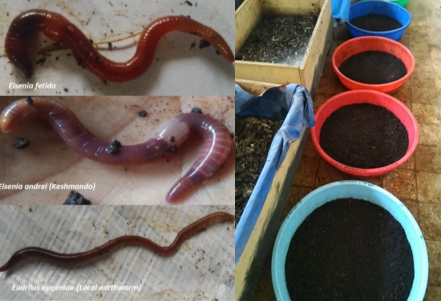Holistic assessment of the potential of indigenous earthworm species for vermicomposting and improving soil and plant health in Ethiopia
Vermicomposting is considered as a suitable technology for organic waste valorization (as biofertilizer, biocontrol agent) in developing countries, especially at the household and community level as it is a simple and natural technology that does not require sophisticated machinery, high capital investment, and frequent process monitoring. The quality and effectiveness depend on the nutrient composition of the feedstock and the earthworm species used in vermicomposting, which are both highly site specific. Unlike some other developing countries, there is very limited information and experience regarding vermicomposting under Ethiopian local conditions. Besides, no data is available on isolating and testing the potential of local species using feedstocks, which are easily accessible to small-scale farmers. Most importantly, few studies focused on characterization the actual effect on plant growth and soil functioning. The current project aims to contribute to filling these knowledge gaps through a holistic assessment of the potential of indigenous species of earthworms in degrading locally available organic wastes, the impacts of the vermicompost on nutrient availability, soil quality, plant growth and disease suppressiveness. To do this we will conduct a survey to assess the type and quantity of locally available organic materials (crop residues and animal manure) for vermicomposting. Local earthworm species will be isolated and their potential for vermicomposting will be investigated using selected feedstocks as a substrate. The physical and (bio)chemical properties of the vermicomposts produced, and the dynamics of nutrient availability and biological soil quality of a selection of vermicomposts will be investigated in controlled laboratory (incubation) experiments. Finally, the impact of selected vermicomposts on plant growth (tomato) and resistance to root-knot nematode (M. incognita) will be evaluated via in vitro, greenhouse and field experiments.
